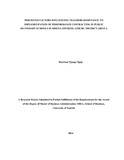| dc.description.abstract | The Kenyan government introduced PCs in 2003. The general perception by that time was
that the performance of the public sector in general and government agencies in particular
had consistently fallen below expectations. The PCs were therefore introduced to try and
improve the situation. The teachers in public school have however strongly resisted the
PC. Despite this acknowledgement little research has been done to determine the factors
that have influenced public secondary schools teachers to resist the implementation of
performance contracts. The objective of the study was to establish the factors that have
influenced secondary schools teachers in the Ndeiya Division of Limuru District into
resisting the implementation of performance contracts. The study utilized the descriptive
survey design. All the 150 teachers in public secondary schools in Ndeiya were targeted
for study of those only 88 responded. The main method of data collection used was
questionnaires. The study established that the following factors were indeed influencing
teachers’ resistance to PC: communication barriers, performance measurement, leadership
commitment to change, motivation, organizational structure, targets, reward and
punishment, organizational culture and performance appraisal. The targets that were set to
be met by teachers was ranked first among the nine factors and was followed by
performance measure which was ranked second and communication barriers which was
ranked third. The organization structure in the institutions was ranked the fourth among
the factors while leadership commitment to change was ranked fifth. Organization culture
was perceived as the least important factor influencing resistance with a ninth rank among
the nine factors. Reward and punishment was ranked the second least important factor
influencing resistance to PC. It was ranked eighth. Motivation was ranked sixth while
appraisal and review was ranked seventh among the nine factors. The study concluded that
the same factors that have been cited by other researchers as influencing resistance to
change were indeed influencing the resistance to the implementation to PC in public
secondary school in Ndeiya Division, Limuru District. These factors were communication
barriers, lack of performance measurement, lack of leadership commitment to change, low
motivation, poor organizational structure, poorly formulated targets, lack of proper
reward, unsupportive organizational culture and inadequate performance appraisal. Based
on the findings the following recommendations were made: communication barriers
should be removed, proper performance measure should be established, head teachers
should be encouraged to be committed to the implementation of PC, teachers should be
properly motivated, organization structure should be redesigned to accommodate PC, the
targets set to be met by teachers should be realistic and achievable, teachers should be
properly rewarded for their efforts, a proper culture should be cultivated that favors the
implementation of PC and the performance appraisal should be adequate. | en_US |

